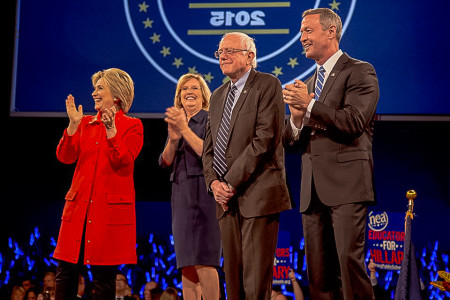Jack O’Malley, Copy Editor
omalleyj17@grinnell.edu

Set less than 100 days left before caucuses begin, the Jefferson-Jackson Dinner has often carried a great deal of importance in past election cycles. The Iowa Democratic Party hosted the large fundraising event last Saturday, Oct. 24, in Des Moines. The dinner first took place in the 1970s and has grown into a key component of the caucus process.
“The Jefferson-Jackson Dinner is recognized as an important moment in the caucus cycle because it provides each campaign the opportunity to showcase its organizing prowess and the enthusiasm of its supporters in addition to enabling each candidate the opportunity to deliver his or her message to a substantial number of caucus-goers,” wrote Josh Levitt, the Press Secretary for the Iowa Democratic Party, in an email to The S&B.
Historically, the dinner has been a time for candidates to really begin to show their strengths to potential voters. In 2007, Barack Obama used the forum as a way to begin standing out amongst his fellow candidates.
Over 6,000 people attended the event, including the three main Democratic candidates, Hillary Clinton, Bernie Sanders and Martin O’Malley.
The Grinnell Campus Democrats played a role in the event as well. Two volunteers, Kate Menner ’18 and Anna Schierenbeck ’18, were present to help run the event. The co-chair of the Campus Democrats and President of the College Democrats and Young Democrats of Iowa, Austin Wadle ’18, was awarded two tickets to the dinner for his participation in party organizing.
At the dinner, the three Democratic candidates all spoke for roughly 30-40 minutes each, which was much more than the original allotted time per candidate.
“They all went very much over time,” Wadle said.
Extra time was allocated since Lincoln Chafee and Jim Webb dropped out of the Democratic nomination race. Despite the freeing up of speaking time, they still went over by roughly 10 minutes each.
As for the content of the candidates’ speeches, it seemed that there was a slight change in the dynamics between the remaining three.
“There were some new lines from some of the candidates,” Wadle said. “Bernie [Sanders] came out as more aggressive and drew a clearer distinction between him and Hillary [Clinton]. It was the same with [Martin] O’Malley.”
Overall the event seemed to bring out a sense of unity amongst the party and the candidates despite the slightly more aggressive rhetoric.
“All of [the] candidates focused on policies that would help middle class families. Whether it’s creating good-paying jobs, making sure education is affordable or ensuring health care is accessible, all of our candidates are looking to build off the progress that’s been made under the Obama administration,” Levitt wrote. “I think it’s clear that Democrats have the momentum and the energy leading into 2016, and we are ready to turn Iowa blue.”


















































